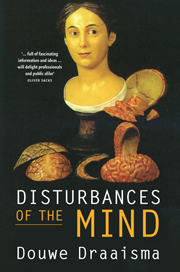Book contents
- Frontmatter
- Contents
- Introduction
- 1 Towards dusk the images appear
- 2 A tormenting round of tremors
- 3 Phineas Gage’s posthumous stroll
- 4 The Celestine prophesy
- 5 Sparks from a Leyden jar
- 6 Siberian brandy
- 7 Go to hell, idiot! Gilles de la Tourette syndrome
- 8 A labyrinth of tangles
- 9 The Mercator of neurology
- 10 The headquarters of madness
- 11 A cup of tea for the doppelgänger
- 12 Little professors
- 13 The Cardan suspension of science
- Index
- References
6 - Siberian brandy
Korsakoff syndrome
Published online by Cambridge University Press: 05 March 2014
- Frontmatter
- Contents
- Introduction
- 1 Towards dusk the images appear
- 2 A tormenting round of tremors
- 3 Phineas Gage’s posthumous stroll
- 4 The Celestine prophesy
- 5 Sparks from a Leyden jar
- 6 Siberian brandy
- 7 Go to hell, idiot! Gilles de la Tourette syndrome
- 8 A labyrinth of tangles
- 9 The Mercator of neurology
- 10 The headquarters of madness
- 11 A cup of tea for the doppelgänger
- 12 Little professors
- 13 The Cardan suspension of science
- Index
- References
Summary
In the Western world, little is known about the life of Sergei Korsakoff. He never got around to writing his memoirs (he died of heart disease at the age of 46) and the biographical sketches which have appeared outside Russia are brief and lean toward hagiography. The image they call up is that of a much-loved master, excellent teacher and fatherly counsellor, set against a background of overflowing lecture halls and waiting rooms still full of patients close to midnight. The information which is available pertains mainly to the public marks of his career: the dates and locations of his education, training and appointments – all in all, little more than the contents of a modern CV. What remains of Korsakoff in the collective memory of Western history of science consists of a handful of fragments and a gaping void: as if historians had been told to reproduce the memory of a Korsakoff patient.
Sergei Sergeivich Korsakoff was born in 1854 in Guss-Chrustallny, a small town some 250 kilometres east of Moscow. It was named after the glass and crystal factory which provided work for many of the inhabitants, including Korsakoff’s father. At the age of 10, Sergei left home to study at a secondary school in Moscow. He must have had excellent language teachers, for several of his articles on what came to be known as Korsakoff syndrome were written in flawless German and English. After completing his medical studies, Korsakoff spent his entire career in neurological and psychiatric clinics. It was as a hospital physician that he was awarded a doctorate in 1887, for his dissertation on ‘alcohol paralysis’ and the other physical and mental effects of alcoholism. When a psychiatric clinic was opened at the University of Moscow the following year, Korsakoff, by then professor of neurology, accepted an invitation to take over as director.
- Type
- Chapter
- Information
- Disturbances of the Mind , pp. 147 - 168Publisher: Cambridge University PressPrint publication year: 2009



